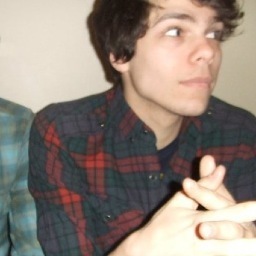More Humanist Reflection (and technical difficulties)
You may or may not have noticed but the site has gone a bit wonky. We’ve run into some technical troubles on our end and are working to take care of it ASAP, so please bear with us as we sort that out. You might notice a bit of the skeleton peeking through and some of our fancier features failing, but other than that it shouldn’t affect the site too much.
In the mean time, I thought I’d provide a bit less of a cerebral reflection for World Humanist Day and share a poem I think that has a particularly Humanist flavor. It’s “Aubade” by Phillip Larkin. I’ve never been good at writing about literary topics, but it’s a special occasion:
I work all day, and get half-drunk at night.
Waking at four to soundless dark, I stare.
In time the curtain-edges will grow light.
Till then I see what’s really always there:
Unresting death, a whole day nearer now,
Making all thought impossible but how
And where and when I shall myself die.
Arid interrogation: yet the dread
Of dying, and being dead,
Flashes afresh to hold and horrify.
The mind blanks at the glare. Not in remorse
– The good not done, the love not given, time
Torn off unused – nor wretchedly because
An only life can take so long to climb
Clear of its wrong beginnings, and may never;
But at the total emptiness for ever,
The sure extinction that we travel to
And shall be lost in always. Not to be here,
Not to be anywhere,
And soon; nothing more terrible, nothing more true.
This is a special way of being afraid
No trick dispels. Religion used to try,
That vast, moth-eaten musical brocade
Created to pretend we never die,
And specious stuff that says No rational being
Can fear a thing it will not feel, not seeing
That this is what we fear – no sight, no sound,
No touch or taste or smell, nothing to think with,
Nothing to love or link with,
The anasthetic from which none come round.
And so it stays just on the edge of vision,
A small, unfocused blur, a standing chill
That slows each impulse down to indecision.
Most things may never happen: this one will,
And realisation of it rages out
In furnace-fear when we are caught without
People or drink. Courage is no good:
It means not scaring others. Being brave
Lets no one off the grave.
Death is no different whined at than withstood.
Slowly light strengthens, and the room takes shape.
It stands plain as a wardrobe, what we know,
Have always known, know that we can’t escape,
Yet can’t accept. One side will have to go.
Meanwhile telephones crouch, getting ready to ring
In locked-up offices, and all the uncaring
Intricate rented world begins to rouse.
The sky is white as clay, with no sun.
Work has to be done.
Postmen like doctors go from house to house.
An aubade is a morning love song (as opposed to a serenade, which is a love song at night), but it’s not immediately clear what this poem is professing love to. It largely seems to be a reflection on death, and how inadequate many of our rationalizations of it are. Religion, that “vast, moth-eaten musical brocade ” is of little comfort, and equally unhelpful are the ”specious” replies many atheists tend to give—I didn’t mind not existing before I was born, so why fear death? and so on. I’ve never been persuaded or comforted by either.
When I was younger, I used to spend long care rides staring out the window and imagining what it’s like to not exist. It seems silly now, but it’s no less terrifying an idea now than it was then. The only difference is that I’ve gotten good at ignoring that death is there. But Larkin reminds us, “Most things may never happen: this one will.”
There’s an alternative, almost stoic sort of way of treating death that Larkin suggests. At certain lonely and calm moments we can simply look at death squarely, realizing fully how terrifying and awful it is. We can’t escape it and can’t accept it. So we move on with our lives. There’s no profound answer, and no way to make death okay.
But work has to be done. The world moves on. The sun rises and we get out of bed.
I find a weird sort of comfort in poetry like this. I’m always interested to hear whether readers have any other works of art that comforts them or has meaning for them specifically. World Humanist Day seems a good time to share them. Vlad Chituc is a lab manager and research assistant in a social neuroscience lab at Duke University. As an undergraduate at Yale, he was the president of the campus branch of the Secular Student Alliance, where he tried to be smarter about religion and drink PBR, only occasionally at the same time. He cares about morality and thinks philosophy is important. He is also someone that you can follow on twitter.
Vlad Chituc is a lab manager and research assistant in a social neuroscience lab at Duke University. As an undergraduate at Yale, he was the president of the campus branch of the Secular Student Alliance, where he tried to be smarter about religion and drink PBR, only occasionally at the same time. He cares about morality and thinks philosophy is important. He is also someone that you can follow on twitter.



